|
Yesterday, Tomorrow and Today...
With Rick Roberts
By RAR
Back in the 1970s I was
living in Boulder, Colorado at a time when that college town, home to the
University of Colorado, was unusually rich with local celebrities. Jim Guercio's
Caribou Ranch recording studio was in operation, which attracted a string of
international talent. Boulder had Northstar and Mountain Ears recording studios,
both of which were attractive recording options. Stephen
Stills and the guys from Manassas were around. Dan Fogelberg was there, and
Richie Furay. I would occasionally socialize with Michael Clarke, who had been
the drummer for The Byrds, and was then drummer for the Boulder band Firefall,
which had initially been called Rick Roberts and Firefall, and was a
top-flight band assembled by the former Flying Burrito Brother, who had been the
Burrito Brothers' replacement for Gram Parsons1. Firefall
included former Gram Parsons and Zephyr guitarist Jock Bartley, Mark Andes, the bassist who was known from the
bands Spirit and Jo Jo Gunne, and David Muse, now with the Marshall Tucker
Band. That only scratched the surface, actually, because there was a constant
parade of notable players with pedigrees from name acts who came and went, and
there was a lively club scene that attracted a rich cadre of "lifers", i.e.,
club musicians who were highly advanced players and were going to be playing in
nightclubs the rest of their lives. It was a musically sophisticated, somewhat
high end, and certainly a fast-living crowd. It was professionally competitive
in terms of musical standards, which gave it kind of a helpful edge, but it was
also extraordinarily collegial on a social level.
On a social level, I was hanging out with a musical group of
friends that would occasionally put me in the company of Rick Roberts, who I was always
impressed with in that he was a big deal rock star and I was me, and yet he was always
very pleasant and polite, somewhat reserved. I sensed that he was a sensitive dude and
tended to like him, though I never really knew him. He was a part of an ethos
that swirled around his band Firefall, which had launched to fame on the strength
of some very catchy Rick Roberts tunes, excellent musicianship (with a
particular nod to
the guitar work of Jock Bartley and the multi-instrumental talents of David
Muse), sweet harmony vocals, and right-on-time arrival in terms of the gestalt
of the place and time. Firefall caught a wave
that was certainly related to the aforementioned energy around Boulder having to
do with the country rock revolution. (In fact, in the Archives of this site
there is an extraordinary table that draws linkages between Firefall and all of
the related acts of the era.)
The Firefall wave was interesting in that this was a band of
musicians with previous experiences on the national stage, and in the Firefall
breakout was another chance for them to enjoy this high level of success with
the benefit of hindsight and perspective.
Michael Clarke, who passed away in 1989 and who was notable
for his excesses, was emblematic of this Firefall ethos, this understanding that
permeated the band. (This, after all, was a bunch of dudes who thought in terms of "Elan",
which was the name of one of their albums.) Michael used to repeat this line he
had heard from another wisened soul, "Just remember that all the people you are
going to meet on your way up are all the same people you are going to meet on
your way down."
Let that sink in for a second and you start to get a sense of
who Roberts, Bartley, Clarke, Andes, Muse and Larry Burnett were, at least in my
experience.
Just as a side note, I contrast that to a vibe I picked up
from another Colorado notable of the time, ex-Byrd, ex-Flying Burrito Brother
Chris Hillman, who produced Rick Roberts' second solo album. I would occasionally
run into Chris Hillman, as well, and I always got the feeling he was going to
sucker punch me. No idea why, he just seemed threatening, and to this day he is
the only person ever to decline an invitation to be a associated with RARWRITER.com. (Well, that's not quite true. Elizabeth Cook's manager doesn't
like the site either, which probably leaves some of you wondering, Who is
Elizabeth Cook? Well, there you go...)
Anyway, I recently had the pleasure of re-introducing myself
to Rick Roberts, via Facebook (just for full disclosure), and the creative guy I
first met 30 years ago is still very much the same, though he has been there and
back, including a crippling accident that has become a slow and arduous recovery, including rehabilitation of his vocal
cords and guitar playing muscles.
Rick Roberts wrote about that and a tremendously wide range of
subjects that are provided in chapter form starting with this edition. These are arranged by general
descriptions of topics that hyperlink to Rick's responses. The questions provided to
Rick Roberts are provided in full below, as well as on the response pages.
The Questions:
Click on the links for the responses
Early Exposure: Q1: To put
changes in the music industry over the years into perspective, let's
talk about how you got your start. I seem to recall hearing a story
once, that might have come from Producer Jim Mason, that you were
"discovered" during a period when you were "busking" as a street
performer? Is that accurate, or how did you initially break in as a
music pro? As a follow-up, if the "busking" story is true, do you have
any thoughts on how "getting out there" in that way might have been
helpful to your development as a performer? Merchandiser?
Music Now: Q2:
Leaping forward now some
40 years... As a guy who has already lived the type of rock star
experience that 99.9 percent of all aspirants never do more than dream
about, does music represent something to you now other than what it once
did before all the successes?
New Recordings: Q3: Let's talk about
the process of recording music, which in your lifetime has evolved from
audio tape to digital technology. You have four new songs available on
iTunes. How were they recorded?
Digital Technology: Q4: The first album
I can recall that was recorded entirely with digital technology was Ry
Cooder's Bop 'Til You Drop (1979), and I recall a lot being made out of
the "clarity" of the recording, though soon enough people like Neil
Young were criticizing digital sound quality. Were you open to the
changes taking place back in that period? And could you sense the
magnitude of what the digital age would mean to the music industry?
Music Industry Changes: Q5: Following
that train of thought, how do you feel the music industry has been
changed by the digital age?
Computer Literacy: Q6:
Are you
"computer literate" and comfortable with digital production? To what
extent have you personally embraced the evolution of digital recording
technologies?
Digital Impacts on Artists: Q7: The
digital revolution that has occurred since you released your first album
with the Flying Burrito Brothers in 1971 has had huge impacts on how
music is produced, recorded, marketed and distributed. What impacts have
you felt as an artist from these technological developments?
Digital Audience: Q8: I often feel that
the natural ease with which young people integrate digital
communications technologies into their everyday lives has a profound
influence on the type of music they relate to. It seemed to me that this
became most apparent in the New Wave period of the '80s with people like
Thomas Dolby, the Thompson Twins, and a personal favorite, Nina Hagen,
and that techno sound is still apparent today in Lady Gaga, Ke$ha, and a
thousand other similar artists. Tools like the T-Pain voice changer can
be downloaded for anyone's use. My long-winded question is this: What
can a guy who came up in the analog age do to be relevant in a digital
world so influenced by the latest gadget?
DIY Ethos: Q9: Our friend Chris Daniels
has written about the "Do It Yourself" ethos that now exists among young
musicians who use the tools provided for the Internet and digital
communications to manage their careers in ways that have only been
possible for a relatively short time. Back before you broke through with
the Burrito Brothers, were you thinking a lot about career development,
marketing and promotions the way kids do today? What did you do to
promote yourself back in 1970?
Communications Technology: Q10:
Comparing your present sense of the music industry with how it must have
felt to you at the beginning of your career, do you find it a bit
overwhelming that communications technology today make so apparent how
large the group of people competing for public attention is? Have you
devised any particular strategy for breaking through?
New Audience: Q11:
Who do you perceive
your audience to be for the new music you are releasing?
Songwriting: Q12: How do your
songwriting skills match up these days against those you exhibited in
the 1970s with chart-topping hits? Are you a different writer now?
Musicianship: Q13: I am always
interested in the relationship between a songwriter and his or her
instrument(s). How much of your focus do you apply to your musicianship?
How does it impact the way you write? And has this changed over time?
Historical Constraints: Q14: As a guy
who was there at the birth of "Country Rock", and by virtue of repeated
airplay on classic rock stations is forever associated with that sound,
do you feel constrained by your history? Are you able to stretch out
into other types of music, or is that of interest to you? What would you
like to do as a songwriter that perhaps you haven't to date?
Songwriting: Q15:
How often do you
write songs?
How Do You Write?: Q16:
Do you write
songs in a calculated way, developing them with any particular sense of
airplay in mind, or do you just write as it you are moved to?
Holy Grail of Airplay: Q17:
Is
"airplay" the Holy Grail these days, or have changes in the industry
reset the target in some way?
File
Sharing Music: Q18: It has always been pretty easy
to copy recorded music for replay and circumvention of payment, but
digital technology has undermined traditional music industry business
practices. This has given rise to whole new models of commerce that
often begin with provision of free service or product leading to
follow-on revenues. Where do you stand on music downloading and sharing?
In an ocean of singer/songwriters, does a guy have any choice but to
have his music "ripped off" in hopes it will lead to a commercial
following?
Current Radio: Q19:
Do you listen to
music and, if so, who are you liking these days?
Best Songwriter: Q20: Who, to Rick
Roberts, is the penultimate songwriter, the person(s) you most admire?
Favorite
Composition - Building A Great Song: Q21: Do you have a
song that you have written that you are particularly proud of? And why?
I ask because in listening to your music one of the things that I am
struck by is the elegance of the constructions. On "You Are the Woman",
for instance, which must be a case study in song structure at some
university somewhere, you open with an instrumental hook (David playing
the flute), go to a single short verse, and then build right into a
catchy chorus section. It all happens very fast, to the listener's
"mind", though it isn't a tempo thing so much as it is a rapid narrative
development. Do you know what I mean by this and would you care to
respond? |

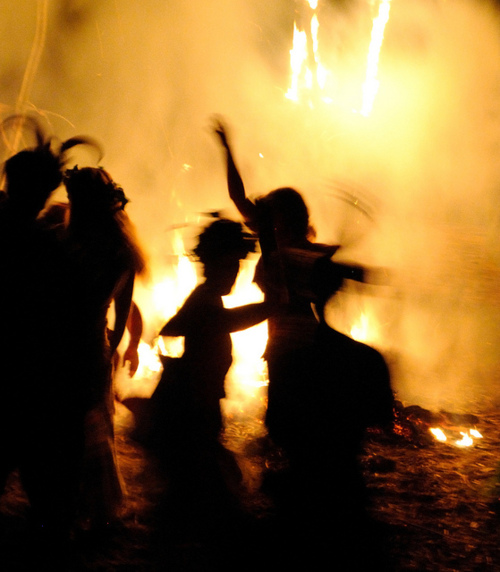
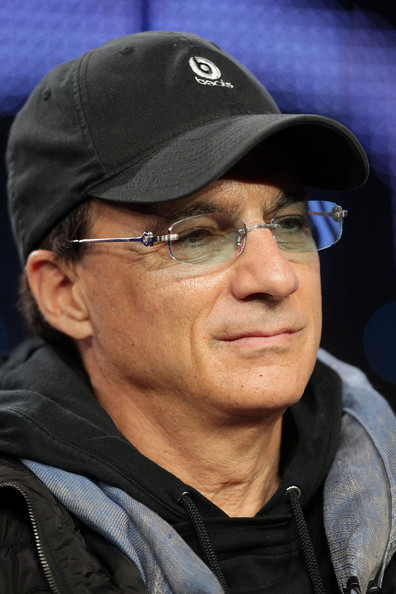 Learning
from Jimmy Iovine
Learning
from Jimmy Iovine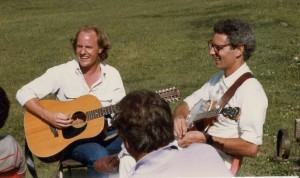
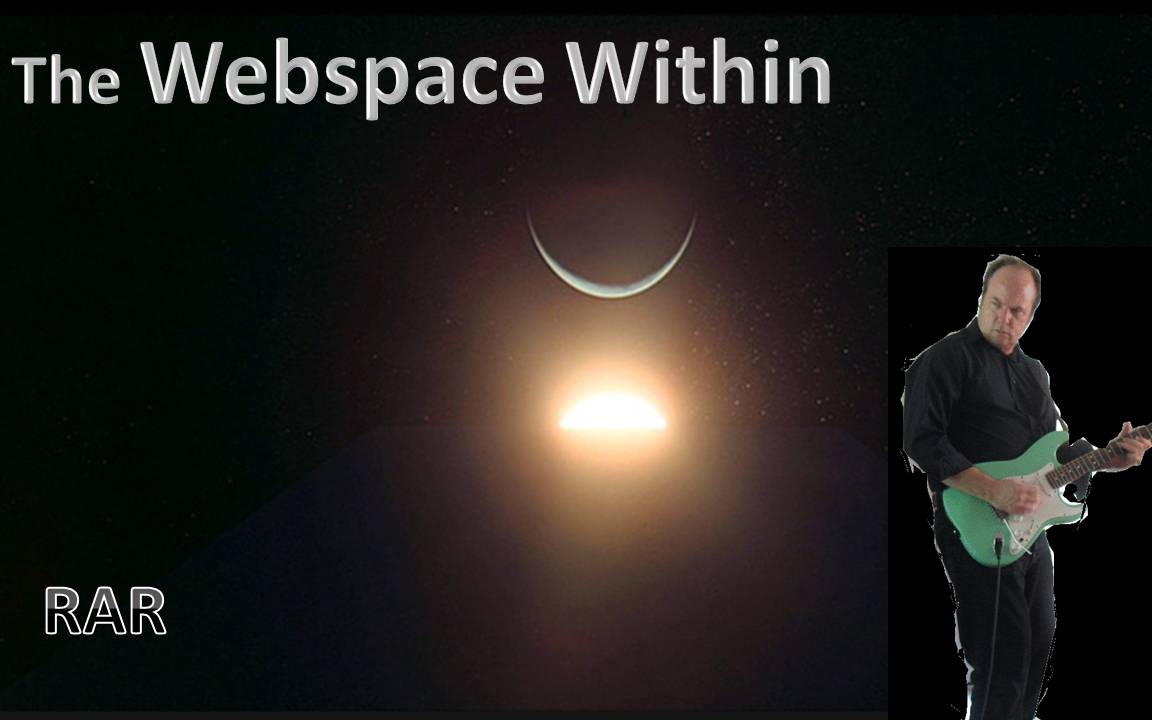
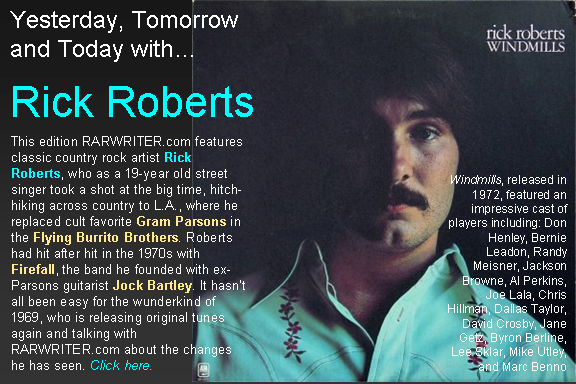
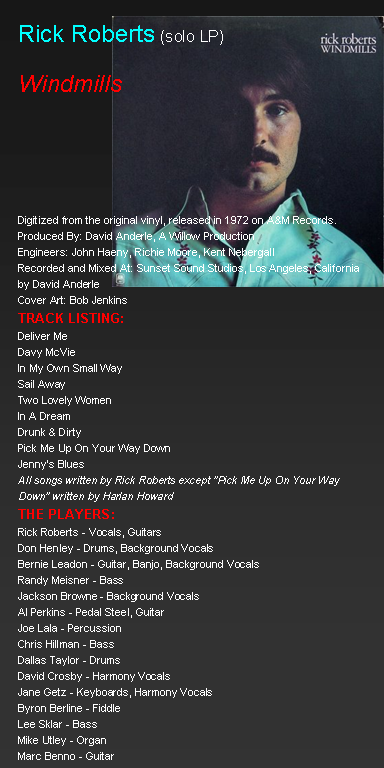
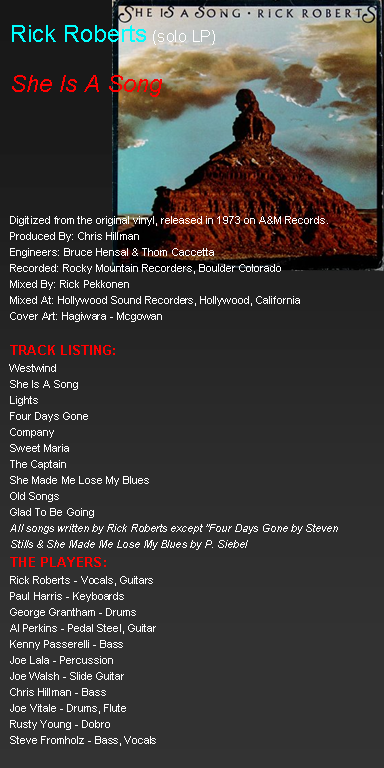
 Click Here -
Click Here -
